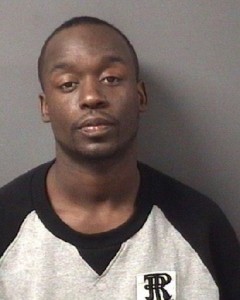A judge with a history of taking decisions out of jurors’ hands on Friday dismissed two counts of aggravated assault, but left untouched more serious counts of murder brought against two Trenton men suspected of killing Mercer County corrections officer Carl Batie in 2012.

Carl Batie
Judge Andrew Smithson said there was insufficient evidence – what he called “rank speculation” – for a jury to consider whether suspected killers Maurice Skillman and Hykeem Tucker pointed a handgun at Batie’s brother, Karshawn, in the early-morning hours of Nov. 11, 2012, outside of Baldassari Regency banquet hall in Trenton.
“Would they be guessing?” Smithson said. “Would they be speculating?”
The judge’s decision leaves three counts each remaining against Skillman and Tucker, who were each initially indicted on six counts.
Before the start of trial, prosecutors dismissed another count of aggravated assault brought against both men for allegedly firing on a woman who was on the balcony at the time of the shooting.
In his split decision, Smithson said prosecutors failed to demonstrate Skillman or Tucker pointed a handgun directly at Karshawn Batie intending to cause serious bodily harm or put him in fear for his life.
No one but Carl Batie was hit by the barrage of bullets, which prosecutors believed was fired from a TEC-9 handgun used by Maurice Skillman.

Maurice Skillman
Tucker was charged under state accomplice liability laws and is not accused of firing any shots.
Karshawn Batie testified at trial he was standing between a planter by a door, watching his brother talk to a security guard on the packed balcony rail when gunfire erupted, sending panicked patrons scattering. Defense attorneys successfully argued that Karshawn Batie was not in the line of fire because he was not near the balcony.
Smithson was not swayed by defense attorneys’ argument on the more serious charges and ruled there was enough evidence for a jury to decide murder and weapons offenses counts brought Skillman and Tucker.
Even though Tucker is not accused of firing any shots, prosecutors believe he engaged in a conspiracy with Skillman and was constructively in possession of the weapon. An weapons experts testified this week he believed the shooter used a TEC-9, but the weapon was never recovered.
Smithson cited other evidence, mainly five camera angles from a surveillance system depicting the interior, exterior and parking lot of the banquet hall. He called it a “continuing snapshot of the defendants.”
The surveillance, he said, appears to show defendants’ “suspicious actions before the shooting.

Hykeem Tucker
The men roam around the parking lot of the banquet hall before the shooting, ducking into alleyways and entering into a white van.
“A reasonable jury has ample evidence” to consider if Skillman and Tucker are guilty of murder, Smithson said. “Were they aiding and abetting each other? A jury could certainly find beyond a reasonable doubt that they were.”
Nicole Carlo, Skillman’s attorney, said she did not expect the judge to dismiss murder charges against both men. But she felt he “made the right decision on the other count.”
Smithson has in the past ruled favorably for defendants.
In 2001, Smithson dismissed attempted murder and aggravated assault charges brought against two New Jersey State Police troopers, John Hogan and James Kenna, who were accused of shooting and wounding three unarmed black and Hispanic men during a 1998 traffic stop on the New Jersey Turnpike, according to the New York Times.
The shooting prompted demonstrations from civil rights activists.
In a 35-page decision in which he criticized prosecutors for bowing to political pressure, Smithson said the troopers’ civil rights had been violated and that they deserved “no less protection from the criminal justice system than that which is afforded other citizens,” The Times reported.
“The motivation to allow the return of the indictments at that time was considerably more a matter of political expediency than of concern for the substantive rights of defendants Hogan and Kenna,” Smithson wrote, according to The Times.
An appeals court later reinstated the charges and blasted the judge for dismissing them in the first place.
Smithson’s decision to dismiss aggravated assault charges in the murder case did not carry as significant political consequences and was unchallenged by prosecutors.